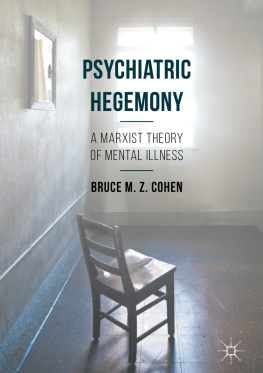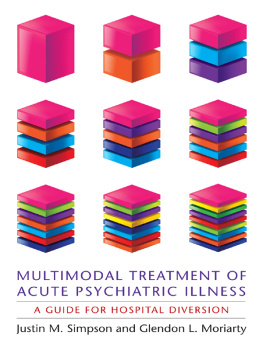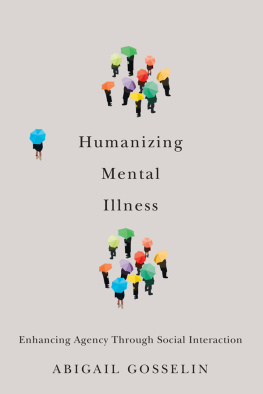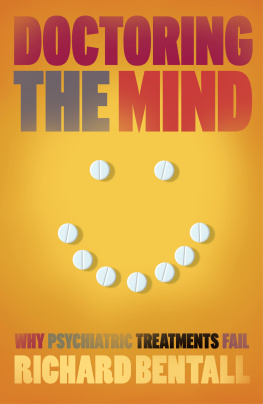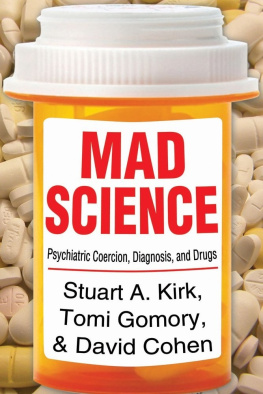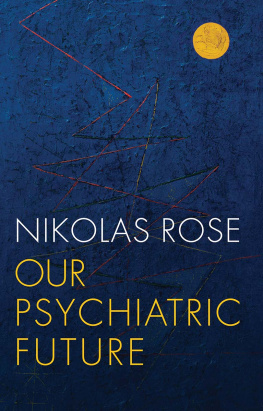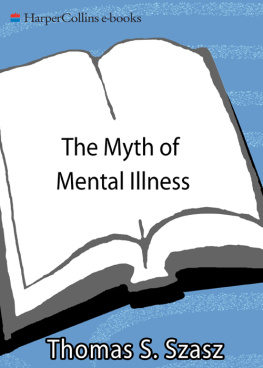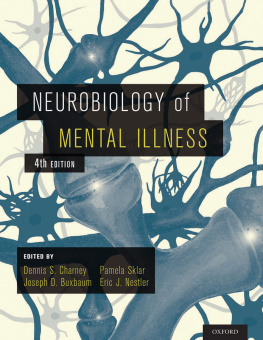1. Introduction: Thinking Critically About Mental Illness
This book is a critical reflection on the current global epidemic of mental disease, and with that, the global proliferation of mental health professionals and the expanding discourse on mental illness. Over the past 35 years, scientific ideas on mental pathology from the designated experts on the mind have seeped outwards from the psychiatric institution into many spheres of public and private life. It is part of my role as a sociologist to explain how this epidemic has come about and the extent to which it is a valid reflection of real medical progress in the area. I am not alone in undertaking such a project; other social scientistsas well as psychiatrists and psychologists themselveshave investigated the recent expansion in the varieties of mental disorder and their usage among western populations, and have voiced similar concerns to the ones that I will articulate in this book. However, as the title suggests, this work goes further than most other scholars and mental health experts appear able to. This is because I frame the business of mental health within its wider structural context, within a system of power relations of which economic exploitation is the determinant one. Ignoring the development and current dynamics of capitalist society has been a significant omission of most other scholarship in the area; this is my contribution to getting critical social theory back to the heart of research and scholarship in the sociology of mental health.
We are, according to the psychotherapist James Davies (: 5).
Consequently, the WHO (: 2).
In the current milieu it is no surprise that the power and influence of the mental health professionals arelike the above statisticsgrowing at a remarkable rate (Davies : 2). However, as every critical scholar on the topic is aware, very serious problems remain with the current science and practice within the mental health system. These concerns inevitably lead us to questioning the reality of the claims to a mental illness epidemic made by health organisations such as the APA and the WHO, and to ask who really benefits from the global expansion of the psychiatric discourse. An essential issue here is the continuing contested nature of mental illness, for there remains no proof that any mental disorder is a real, observable disease. Consequently, the experts still cannot distinguish the mentally ill from the mentally healthy. In fact, a recent attempt by the APAthe most powerful psychiatric body in the worldto define mental illness was bluntly described by one of their most senior figures as bullshit (see discussion below). Accordingly, it also follows that no treatment has been shown to work on any specific mental illness and that there is no known causation for any disorder. Of course, these issues are highly disputed by many mental health professionals, so the evidence and debates are outlined in detail in the chapters that follow.
I appreciate that questioning the validity of mental illness comes as little comfort to those people who are currently experiencing stress, trauma, or behaviour which causes what Thomas Szasz (), this is not the focus of the current book. Instead, the issue at hand is how to explain the incredible expansion of what we might call the mental health industrythat is, the entirety of the professionals, businesses, and discourse surrounding the area of mental health and illnesswithout a concurrent progression in the scientific evidence on mental pathology. The next section briefly explores some of the main explanations given for the dominance of the current mental health system and the gaps in this work.
Critical Scholarship on Mental Illness
Most commonly, critical scholars focus on one major reason for the current expansion in the numbers and categories of mental illness in western societynamely, the influence of pharmaceutical corporations (colloquially referred to as big pharma) on the construction of new categories of disorder and the promotion of drug solutions for those disorders (see, e.g., Davies ). The more behaviour and experience that can be successfully medicalisedthat is, reconceptualised as in need of medical interventionthrough this medico-industrial partnership, the more drugs can be potentially sold to the public. Thus it is argued that the expansion of the mental illness discourse is the result of a market takeover of health care; corporations rather than medical practitioners are now designating what mental pathology is and, as a result, dictating treatment. The obvious solution to this situation involves the de-coupling of mental health services from the influence of big business. Tighter government regulation and oversight of pharmaceutical corporations is required, as is transparency within the relevant professional organisations.
While this critique of big pharmas intervention in the production and promotion of the contemporary psychiatric discourse is relevant, it is perhaps the least surprising aspect of the operation of the mental health system within capitalist society. Scholars of medical history such as Andrew Scull (), for example, have profiled a continuing trade in lunacy which can be traced back to the beginnings of industrial society and witnessed throughout the development of modern mental health work. That the market is part of the workings of psychiatry and related professions should be self-evident to any scholar aware of the history of the mental health system in western society. Such critics would also acknowledge that while psychiatry legitimates the products of big pharma, pushing psychopharmaceuticals in turn helps legitimate the psychiatric profession. The prescribing of drugs is a key symbol of modern doctoring which serves to align psychiatric practice with other branches of medicine through a shared biomedical understanding of health and illness.
The medico-industrial relationship described above has raised an associated criticism from critical scholars as to the efficacy of the biomedical approach in understanding mental health problems more generally. Biomedicine conceptualises disease as a physical pathology of the body. Thus, biomedical psychiatry theorises mental disorder as having a physical aetiology (causation) that can be observed, measured, and treated. Modern psychiatry focuses on the brain as the organ that causes such disease, and most often regards mental illness as the result of faulty neurotransmitters or chemical imbalances in the brain. The biomedical approach to understanding mental illness have been a part of psychiatry since its emergence over 200 years ago, yet has become increasingly dominant within the mental health system since the 1980s (Chap. ).
Critics call for an understanding of mental disorder which goes beyond biological reductionism to consider psychological, social, and environmental factors which correlate with mental illness. Often conceptualised as the psychosocial model (or simply, the social model) of mental illness, scholars and experts highlight a range of evidence from socio-economic data which demonstrates that such factors as family income, educational level, ethnic group, geographical location, and social class are all closely related to the chances of developing a mental health problem. While the social model suggests that we all have the potential to suffer mental disorders if exposed to traumatic situations, some groups are particularly vulnerable to mental illness due to experiencing comparatively more stressful life conditions and, at the same time, having less access to cultural and economic resources which can alleviate the threat of mental problems. As the WHOs () recent Mental Health Action Plan 20132020 has emphasised,

